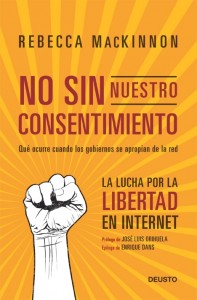Rebecca MacKinnon, co-founder of Global Voices, is a journalist and blogger with many years of experience, very refined in her opinions on the topics that she is involved with, which are usually related to knowledge society and freedom on the Internet. Last January she published her book Consent of the Networked, where she goes in depth into this subject matter. To mark the publication of this book, Global Voices contributor Bernardo Parrella wrote:
How do we ensure that the Internet develops in a way that is compatible with democracy? Given the strong push provided by social media to the recent uprisings in the Middle East region and elsewhere, how can people ensure that the same tools are not being used for government censorship and surveillance (often with more than a little help from Western technology companies)? And ultimately, how can we stop thinking of ourselves as passive “users” of technology but rather as “netizens” who take ownership and responsibility for our digital future?
The book was published in Spanish last June by Editorial Deusto [es] under the title No sin nuestro consentimiento (Not Without Our Consent) [es]. The Spanish-language edition includes additional texts of two ‘gurus’ of the Hispanic Internet: José Luis Orihuela wrote the prologue, and Enrique Dans wrote the epilogue. Orihuela blogged about it and posted the prologue online, which among other things says [es]:

El gran tema que plantea MacKinnon en esta obra es nada menos que la gobernanza de internet, y la exigencia de reclamar como ciudadanos digitales que las decisiones políticas y corporativas que afecten a la red no se tomen sin nuestro consentimiento informado.
No sin nuestro consentimiento es un amplio y detallado diagnóstico sobre las prácticas corporativas y los controles gubernamentales que están cercenando los espacios digitales de la sociedad civil, pero también un inventario de iniciativas en marcha que abren caminos para expandir los bienes comunes digitales frente al avance de las empresas tecnológicas y de los gobiernos sedientos de control.
The great topic that MacKinnon considers in this book is none other than the governing of the Internet, and the need to demand, as digital citizens, that the corporate and political decisions that affect the Internet should not be taken without our informed consent.
Consent Of The Networked is a wide and detailed diagnosis about corporate practices and governmental controls that are cutting off digital spaces in civil society, but also an inventory of initiatives working to open paths in order to expand common digital assets in face of the advance of technological businesses and governments thirsty for control.
Enrique Dans did the same and among what he comments on in the epilogue that he wrote, the following [es] can be highlighted:
si algo hace este libro es despertar la preocupación por comprobar hasta qué punto, si las cosas no cambian, tendremos que, cuando hablemos con nuestros hijos, referirnos a la red como a un espejismo de libertad que vivimos a lo largo de un par de décadas, pero que terminó por convertirse en otra cosa. Nunca, en ningún otro momento de la historia de la humanidad, hemos tenido tan clara conciencia de hasta qué punto estábamos siendo manipulados por un poder que, disfrazado de algo que llamaban democracia, se dedicaba a manejar a las personas mediante el uso de medios unidireccionales, de asimetrías comunicativas y de técnicas de manipulación colectiva. Si algo hace este libro es demostrarnos que, como debería ocurrir con el poder en el mundo físico, el poder en el mundo digital debe ser restringido, balanceado y controlado por los propios usuarios.
If this book does something, it is to evoke concern about realising up to what extent, if things do not change, we will have to, when we speak with our children, refer to the Internet as an illusion of freedom that we lived for a few decades, but which ended up becoming something else. Never, not in any moment in the history of humanity have we been so clearly aware to what extent we were being manipulated by a power that, disguised as something that used to be called democracy, spent time manipulating people through the use of unidirectional media, communicative asymmetry and techniques of collective manipulation. If this book does something, it is to show us, as should happen with power in the physical world, that the power of the digital world has to be restricted, balanced and controlled by the users themselves.
I spoke briefly with Rebecca about her book during the most recent Global Voices Summit in Nairobi, Kenya:
Perhaps it's not for sale in all Latin American bookshops, but in any case it remains a piece of recommended reading. Electronic versions are available in Spanish and English.







3 comments